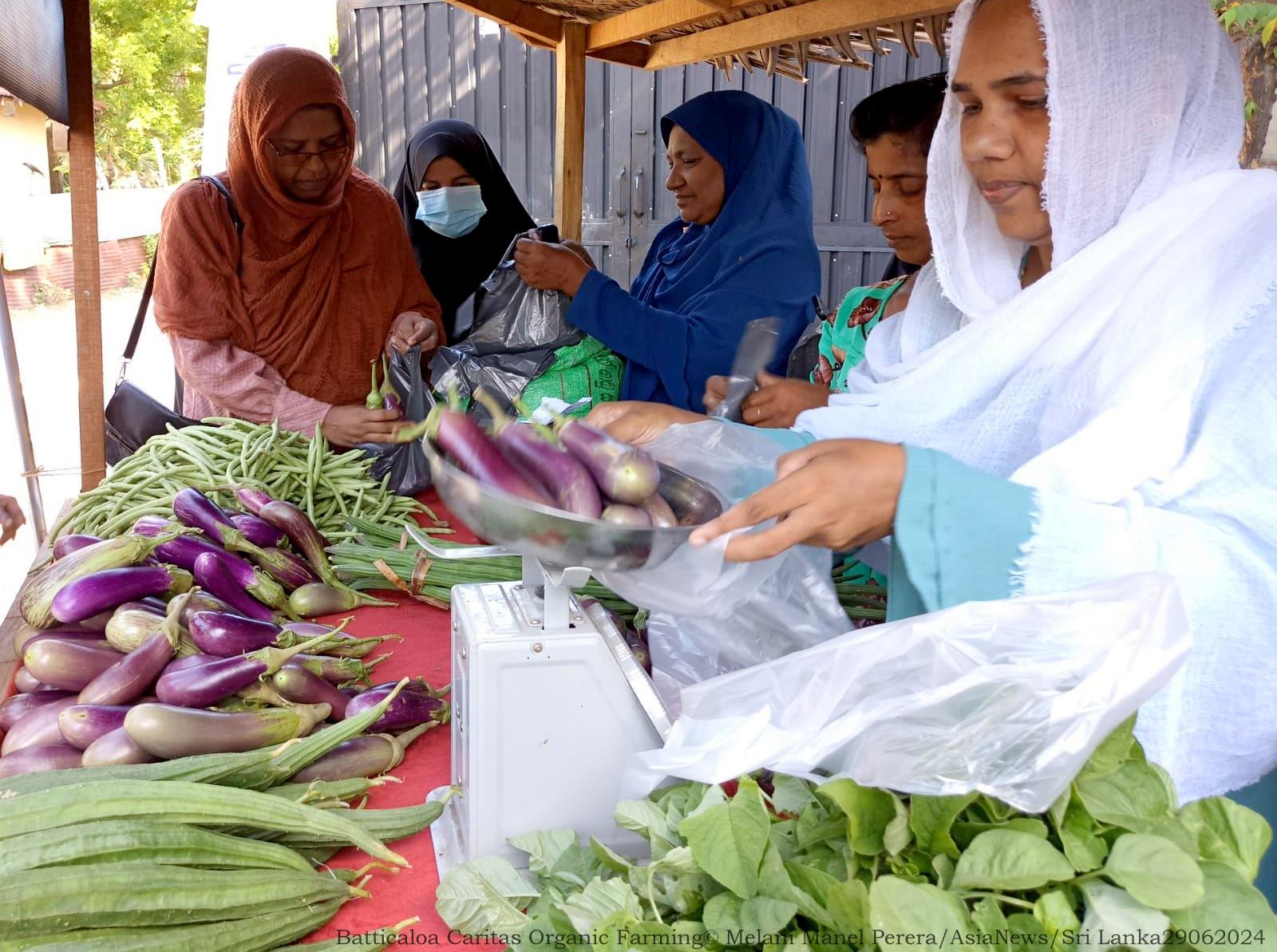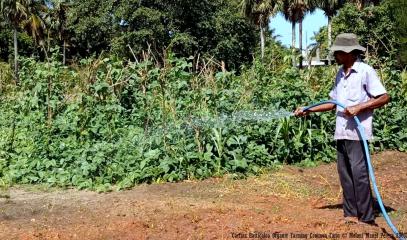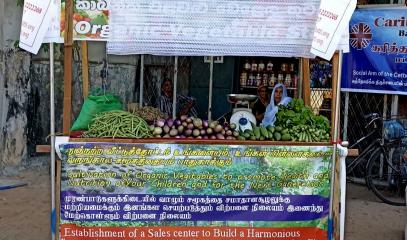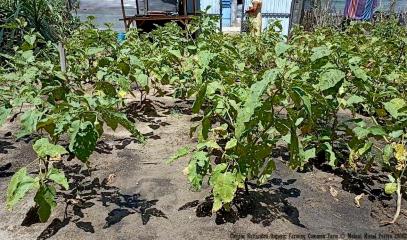Healing the wounds of war with organic farming in Batticaloa
In Iyankarni, a village in the Eastern Province, the civil war destroyed lives and relations between Muslims and Tamils. Now, thanks to an organic farming project promoted by Caritas Batticaloa, the two communities are working together to rebuild their lives. For the charity’s director, Fr Samson Jayanixon, “healing people and building harmony between them are the core of religions.”
Batticaloa (AsiaNews) – “Not only when the sun was up, but even in pitch darkness, we snuck into the jungle and the bunkers as soon as we heard the sound of shells and mortars. Until dawn, we took naps fighting with mosquitoes. When the gunshots stopped or when the sun rose, we stepped back into our homes again in fear. Sometimes when we came back, we told ourselves that this was still the same house we had left behind, even though it had been destroyed. We, who once lived with fear, now thrive with joy, serenity, wealth, and affection and live and work together.”
These are the genuine feelings shared by Tamil and Muslim residents in the two sections of the village of Iyankarni, Grama Niladhari[*] Division, Batticaloa District, Eastern Province.
War as a dividing line
For 30 years, the war indiscriminately destroyed lives and property across the country, particularly in the Northeast. Trust and goodwill between the Sinhalese, Muslim and Tamil communities was broken, and friendship and business between them collapsed. The Iyankarni area, in Batticaloa, is an example of this.
“Once all of us Sinhalese, Tamils, and Muslims lived in peace. We conducted our business in the same market. We did transactions, held festivals. Muslims came to our Hindu festivals, we attended their Ramadan festivals, and we exchanged tasty food and drinks and we lived with love. That was before that war," said Muthumari, a Tamil elder in Iyankarni.
“I am very familiar with the sound of gunshots and the sound of bombs,” said Joseph Mayura, a woman who lived through the war since the age of 10 during which she lost her husband.
“I still remember those days when our mothers took whatever they could and dragged us into the closest school and camp. We felt scared when we heard the sound of guns, bombs exploding, voices of the security forces.”
Some people, on both sides, joined security forces and persecuted each other, entering villages, damaging homes, seizing land, stealing, killing animals.
In Iyankarni alone, the war had a very cruel impact on the lives of 198 women, men, youth and adults; it is still unclear whether they are missing or if some are still alive. About 145 of them were university students, young men and women who were studying and working.
Other men and women who were wounded in clashes between government forces and Tamil fighters are still alive, but none have received any relief from the warring parties or the government, they say.
Helplessness caused by war
According to UN estimates, between 40,000 and 70,000 civilians died in Sri Lanka’s north and east in the "final months" of its long civil war, which ended on 18 May 2009, with a death toll of 150,000 in 30 years of brutal atrocities. In addition, about 65,000 men and women are still missing.
According to 2020 data from the North-East Divisional Secretariat, 127,000 women are heads of households in the East. Of these, 51,000 live in the Batticaloa district alone. Because of war, for these women, it is hard to survive without support.
In Iyankarni, Tamils and Muslims were very scared after the war when a strict ban was in place against Tamils entering the Muslim area and vice versa, an initiative of young people on both sides.
“This situation had become a concern for the ordinary people and as the rift escalated, the love between the two parts was destroyed and the hatred remained,” said Ghaneshamurthy Maidili, 38, who lives in Bharathipuram, which is part of Iyankarni.
A helping hand to get back on one’s feet
After the war, the Sri Lankan government, foreign countries, the United Nations, the World Food Programme, the International Red Cross, and foreign NGOs provided humanitarian aid for the purpose of “resettlement, rehabilitation and reconstruction".
Programmes provided relief to victims in displacement camps in the North, the East, and elsewhere.
In interviews with 35 Muslim and Tamil women and men, young and old, in Iyankarni, many of the victims of the war received financial support from Samurdhi. Some financial aid went to war widows, but it was not enough given the cost of living.
Apart from subsidies provided in special situations such as epidemics and disasters, the government is not providing any help at present, Maidili explained.
Upon inquiry, the Ministry of Rehabilitation and Reform and the Ministry of Agriculture have no new programmes for locals.
Although there was talk about “building reconciliation, building their lives and working together" to achieve true reconciliation as a long-term goal, no programmes have been launched.
Some organisations from the South are still implementing various programmes in the northern and eastern provinces, but the latter have no room for the reconciliation that the people of the North and East really want, this according to Anthony Jesudasan, former national coordinator of the People's Dialogue for Peace and Sustainable Development of the National Fisheries Solidarity Movement (NAFSO).
According to Udaya Rajidhika, who lives in Bharathipuram, a certain understanding between the two sides began to develop in Iyankarni long after the war; this is a positive start, thanks to programmes carried out by various governmental and non-governmental organisations.
“Among all those programmes, a project presented recently by Caritas Batticaloa gave us great guidance to rebuild. The activities in those programmes and the home gardening project helped us Tamils and Muslims to heal the many wounds we suffered during the war, and now we are very happy,” she said.
Rebuilding broken lives in diversity
Gnanpragasam Vijaya, from Iyankarni Tamil, said that the organic gardening project introduced in January this year by Caritas Batticaloa has brought a new dawn to the lives of villagers.
“We are engaged in organic home gardening as a group and because of the vegetables and fruits, everyone in the family lives a healthy life. We sell organic vegetables and fruits at a low price for our consumption as well as to the people of the surrounding villages, so we now have savings," said Vijaya.
“According to the settlement pattern of Tamil and Muslim people in Iyankarni, although it involves two areas, 31 families from the Muslim area and 26 families from the Tamil area, they are associated with Caritas Batticaloa directly and many more families benefit indirectly from the organic home gardening project,” said Father Samson Jayanixon, director of the Batticaloa Caritas, Human and Economic Development Centre (EHED).
“Besides these women doing organic home gardening, both Muslims and Tamils also run four communal farms. They share all the work, allocate days and times, and contribute generously to the growth of the farms, because, they belong to them, along with the income. A fair income dividing system has been prepared,” said the clergyman.
Fr Jayanixon added that, through these projects, people are recovering the wealth, values, culture, and life they had and lost during the war. “I am happy about this because healing people and building harmony between them are the core of religions," said Father Jayanixon.
Gaining economic benefits, community markets and reconciliation
Dambagalle Vanarathana Thero, the main manager of Punyarama in the Eravurpattu area, expressed his appreciation for the unity and understanding created between local Muslim and Tamil communities thanks to the visionary work of Caritas Batticaloa with the introduction of a valuable organic farming project.
"After paying more money for so long, buying goods from the market and consuming them, people became ill from eating them. Now we live very happily because of the organic farming. We all eat fresh vegetables and fruits that are not poisonous,” said Marshuka, who lives in Iyankarni’s Muslim area, along with several other women who benefit from the organic farm.
“The special thing is that because of this project, a great relationship and unity between us and Tamil people has been built again. We are very happy about it. All the credit should go to EHED, Caritas Batticaloa Centre, and the father director.”
Muslim women from 31 families, including Hamzia, Sulfica and Marzuka, speak of the organic farm with respect, saying that it is a great opportunity to receive from Caritas at a time of great economic crisis.
“We are now selling the surplus vegetables we grow at home at reasonable prices. Thus, we get additional income. Eating nonpoisonous vegetables, surplus income, and growing Muslim-Tamil unity: What else do we need?” they said. “We now are working together like in the old days, with unity and love. Our children go to school together and are playing together.”
This is the true voice of reconciliation and development of the Tamil and Muslim community in Iyankarni, Batticaloa.
[*] Grama Niladhari: village officers.
28/07/2020 15:11










.png)










